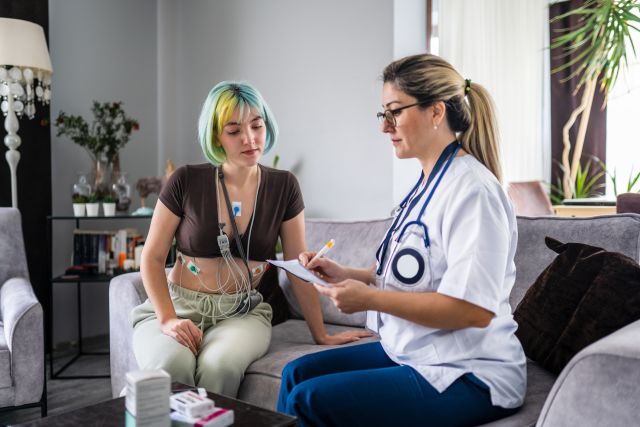Hypertrophic cardiomyopathy (HCM) is a genetic heart condition that causes thickening of the cardiac muscle. This can make it difficult for the heart to pump blood effectively.
While many people with the condition experience few or no symptoms, others experience chest pain, shortness of breath, and abnormal heart rhythms. Regardless of symptoms, everyone with the condition is at risk for serious complications and should be working with a cardiologist.
If you or a loved one has been diagnosed with HCM, the topics below can help you during discussions with your healthcare providers.
Preparing for your appointment
It helps to prepare before any healthcare appointment, even routine care. Here are some strategies to consider:
- Write down what you want to discuss at the appointment. This can be questions or concerns you have about your diagnosis, your current treatment, your other treatment options, or the ways that HCM is impacting your life.
- Keep an up-to-date list of all the medications you are taking, including any over-the-counter medications or supplements.
- Keep a journal where you record what you did each day and how you are feeling. HCM can change over time, and a journal can help you identify any changes.
- Always inform your healthcare provider about any new symptoms, changes in symptoms, and the ways that HCM is impacting your life.
- Have a way to take notes during your appointment. Sometimes, people like to bring along a family member or friend who can provide support and take notes.
- If there is anything you do not understand about any part of your diagnosis—such as what a test result means or how a treatment works—ask for clarification.
Treatment and medications
Medications are often a part of treatment for people living with HCM who are experiencing symptoms.
- Ask any questions you have about the dosage, schedule, or how to take the medication.
- Ask how the medication works to treat HCM or HCM symptoms.
- Bring up any concerns you have about taking the medication, including the cost of the medication.
- Ask about side effects the medication can cause, and what to do if you experience a side effect.
- Ask how you will know if the medication is working.
- Ask what other options you have if this medication does not work.
- Ask if there are new medications for HCM that have become available.
Surgical and nonsurgical procedures are also used to manage HCM in some cases. Discuss these questions with your healthcare provider:
- The name of the procedure, how it works, and the goal of the procedure. Again, ask for more explanation when you need it.
- Ask why the procedure is being recommended.
- Ask about the potential risks and benefits of the procedure.
- Ask about the recovery process after the procedure.
- Ask about the cost of the procedure.
Lifestyle modifications
Lifestyle modifications are an important part of managing HCM:
- Ask about the safety of exercise and other types of strenuous activity. Make a note of what is safe and what needs to be avoided.
- Ask about habits and behaviors that can impact the health of your heart, including alcohol consumption, tobacco use, or recreational drug use.
- Ask about nutrition, including what foods to eat more of, and what foods to limit or avoid.
- If you have another health condition such as diabetes or obesity, ask what you can do to manage that condition while managing HCM.
Family screening and genetic testing
HCM is a genetic disorder, meaning it is inherited from family members. If a person has HCM, their blood relatives are at an increased risk, and there is also a risk of passing the condition on to children. Discuss these topics with your healthcare provider:
- Ask about the process of informing family members about a diagnosis and recommendations for discussing a diagnosis with family members.
- Ask about screening and genetic testing for family members, including how the process works and what it costs.
- Ask for materials that you can share with family members to help answer any questions they have about HCM.
What to do in an emergency
HCM is a serious condition that can cause medical emergencies—and it’s important to have a plan in place in case you experience an emergency.
Ask what to do if you experience a new symptom, a worsening symptom, or any change. Ask your healthcare provider about the signs and symptoms that could signal the need for immediate medical attention—for example, calling 911 (or other emergency number) if you are experiencing rapid or irregular heartbeat, difficulty breathing, and/or chest pain.





